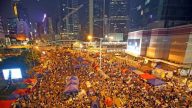【新唐人2014年10月06日訊】通過中共黨媒的連番炮轟後,日前香港出現大批所謂反佔中人士,不斷挑起事端,並毆打佔中人群。與此同時,香港特首梁振英發表電視講話,要求抗議民眾撤離,防暴警察也大批出動,並再次噴射胡椒水。不過佔中民眾沒有退讓,反而有更多民眾出來聲援。中國旅美民主鬥士陳光誠和魏京生向本臺記者表示,香港民眾只要堅持下去,就會勝利。
據香港《蘋果日報》報導,截至5號晚上8點左右,香港特首辦外面,仍然有數百名市民繼續留守。有佔領多日的市民表示,即使面臨警方胡椒噴霧攻擊,甚至死亡風險,也不會畏懼。市民同時強調,沒有合理理由,集會市民不能失守佔領陣地。
4號,香港特首梁振英再度發表電視講話,指稱佔中學生堵塞了通往政府總部道路,星期一必須離開。
不過,香港學聯5號發出四點回應,聲明通往政府總部的入口一直保留開放,請政府不要再混淆視聽。在政改問題沒有成果前,要求佔領者撤離,難以服眾,希望政府展開對話誠意,切勿拖延。學聯強調,警方妥善處理佔領點贊成與反對佔領市民之間的衝突,是開展學生和政府對話的前提。
盲人維權律師陳光誠:「有理走遍天下,香港的朋友們你們的要求是合理的,是正當的,是社會發展的必然,中共拒絕給我們本來就屬於我們的權利,是反動的,是逆歷史潮流而動的,我們只要堅持就能勝利,世界人民都在看著我們,都在支持我們。」
3號晚,部分所謂反對佔中的市民,對佔中學生大打出手,甚至專門有針對女學生的流氓隊伍對女學生進行性侵犯。外界不斷髮現,攻擊香港佔中人士中,有不少可疑人物。
由於反佔中人士持續挑起衝突,導致警方不斷施放胡椒噴霧驅趕佔中學生。截至5號下午6點,已有165人入院治療,大部分已經出院,9名仍留醫。
在經歷了催淚彈、胡椒噴霧和黑社會的暴力洗禮之後,4號晚,有超過十萬的香港市民走出來,逼爆金鐘。
而警察公共關係科總警司許鎭德,在被問到清場能否不使用催淚彈或橡膠子彈時,沒有正面回答,只是說會在適當時候採取適當行動,警方有信心有決心去恢復社會秩序。
旅美民主活動家魏京生:「其實是共產黨內鬥引起的矛盾,本來香港的事情沒那麼激烈,但是共產黨裡頭有一批人在不斷的挑,就跟六四差不多,把群眾情緒挑起來了,所以變成這麼一個激烈街頭運動了,這是第一,第二這個運動起來了,對中共來說,那是一個燙手的山芋,基本來講,我覺得香港的群眾能堅持下去,一定能取得一個比較好的結果。」
那麼,這次香港警方會不會像外界擔心的那樣,暴力清場呢?
陳光誠:「香港不是天安門,現在的社會也不是你把燈一關就能做壞事的時候了,中共現在我覺得可能一方面在看著香港,一方面全力盯在已經覺醒的公民身上,如果他轉身去對付香港的民眾的話,中國的公民我想也不會袖手旁觀。」
魏京生:「我相信中共裡頭有很多有良知的上層領導,他們也不願意再出現一次六四,因為這一次環境不一樣了,這一次再出現一次,我覺得共產黨可能就有點扛不住了,上次可能矇混過關了,國際社會在拍著共產黨的馬屁,要聯合起來對付蘇聯。」
台灣民進黨主席蔡英文指,香港佔中行動給予台灣人啟示,認為只要大家團結站出來,就可以改變命運。
學聯秘書長周永康為佔領行動對市民帶來不便致歉,他重申,本次運動絕非「革命」。今天的不便,是為了將來民主道路的暢通。
採訪編輯/劉惠 後製/蕭宇
Chen Guangcheng:
The Keys To Wining Occupy Central Are Endurance and Persistence
After party mouthpieces attacked Occupy Central for days,
a large number of so-called Occupy Central opponents
appeared in Hong Kong.
They instigated many conflicts and used violence
to attack protesters.
Hong Kong’s chief executive Leung Chun-ying also spoke
on TV, demanding protesters to retreat.
Riot police were also dispatched on a large scale,
and used pepper spray against protesters.
Despite all of this, Occupy Central protesters did not
step back.
On the contrary, more Hong Kongers joined them.
Famous democratic activists Chen Guangcheng
and Wei Jingsheng, who both live in the U.S. now,
told NTD that they believe Hong Kong people will win
the battle if they can endure and persist.
According to Apply Daily, hundreds of civilians remained put
outside the Office of the Chief Executive as of 8 p.m. Oct. 5.
Those who had stayed there over days said they were afraid
of a pepper spray attack from police or even death.
Other civilians said protesters should not easily
retreat from their “battle field.”
On Oct. 4, Hong Kong’s chief executive Leung Chun-ying
gave another TV address.
Leung claimed student protesters had blocked the road
to the government headquarters.
He required all protesters to leave by Monday.
In response, Hong Kong Federation of Students (HKFS)
made an announcement on Oct. 5, stating the entrance
to the government building had always been left open.
HKFS asked the Hong Kong government to stop making
misleading statements;
The public will not be convinced if protesters are required to
leave without making any progress in political reform issues.
HKFS hopes the government stops dragging on and shows
some sincerity in beginning dialogue with protesters.
HKFS said the precondition for any conversation is that
the police have to properly resolve conflicts between
pro and anti Occupy Central groups.
Chen Guangcheng, blind rights activist: ”With justice
on your side, you can go anywhere.
I want to tell my friends in Hong Kong, “your demands are
reasonable and legitimate, as they follow the right direction
in social development.
The Chinese Communist Party (CCP) refuses to give us rights
that we should have since birth, so it is reactionary
and acts against the tide of history.
We will win the battle as long as we endure and persist.
The whole world is watching and supporting us.’”
On the evening of Oct. 3, some residents claiming to be
opponents of Occupy Central violently attacked protesters.
There were even hooligans focusing on sexual assault
against female students.
Global media has pinpointed many suspicious characters
among the anti Occupy Central group.
The conflicts started by Occupy Central opponents
also gave police the excuse to continuously use pepper
spray against students.
By 6 p.m. on Oct. 5, 165 were sent to hospital.
Most of them had been discharged, but nine remained
in the hospital.
After experiencing tear gas attacks, pepper spray
and mafia-like groups, over 100,000 Hong Kongers
gathered at Admiralty for protest on the evening of Oct. 4.
On the other hand, when asked about whether police will
stop using tear gas or rubber bullets, the director
of Hong Kong Police Public Relations Branch
did not reply directly.
Instead, he only said HK police would, “take proper action
at proper times” and “have the determination
to recover social order.”
Wei Jingsheng, democratic activist: ”The conflicts mostly
result from the CCP’s internal struggle.
Otherwise it should have not been that bad.
There are always a group of people stirring things up
inside the CCP.
They provoke public sentiment like what they did
during the June Fourth Incident.
Therefore we have seen street protests turning into
such tough situations.
But meanwhile the movement has also become a hot
potato for the CCP.
In general, I think if Hong Kong people can stick to what they
are doing right now, we will see a good ending to the story.”
The question is whether HK police will use violence
to drive protesters away.
Many are concerned about this.
Chen Guangcheng: ”Hong Kong is not Tiananmen Square.
In the modern world, you can no longer turn the light off
and do whatever you want.
The CCP is focusing on Hong Kong, but I think meanwhile
it is also guarding over those awakened Chinese citizens.
If the party really does something to Hong Kong people,
Chinese people may not sit it out.”
Wei Jingsheng:”I believe there are conscientious CCP leaders
who do not want to witness another June Fourth Incident.
After all, the world has changed.
If another June Fourth Incident occurs,
the CCP will probably not survive that.
Last time it muddled through as the global society still
needed it to resist the Soviet Union.”
Tsai Ing-wen, Chair of Taiwan’s Democratic Progressive Party,
said Hong Kong’s Occupy Central movement could teach
the Taiwanese a good lesson.
That is, when people unite together
they can change their lives.
HKFS secretary-general Chow Yong-kang apologized
for inconveniencing Hong Kong people’s daily life
due to Occupy Central.
Chow said that the movement is not a revolution,
and today’s inconvenience will serve to clear the road
for future democracy.
Interview & Edit/LiuHui Post-Production/XiaoYu


















